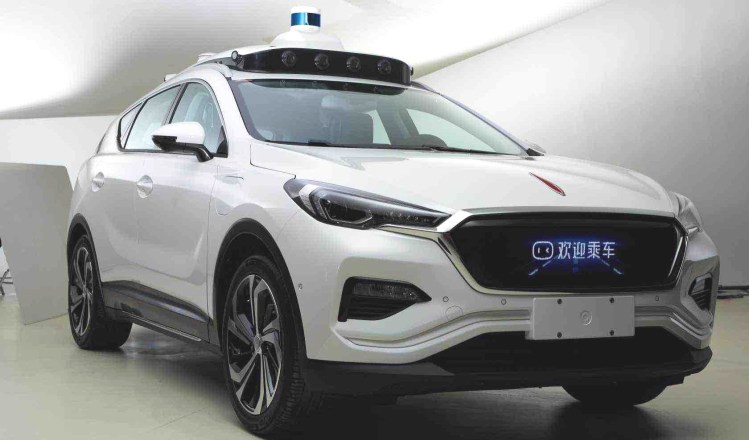Today at Baidu’s annual Create AI developer conference in Beijing, the China-based search giant announced a slew of updates across its ever-expanding driverless car ecosystem. They come as analysts at Research and Markets forecast there will be some 20 million autonomous and semiautonomous cars in operation in the U.S. by 2030, up from millions today.
Baidu revealed that its fleet of 300 level vehicles across 13 cities recently achieved a major milestone: 2 million kilometers (1.2 million miles) driven autonomously in urban environments. (The Society of Automotive Engineers defines level 4 as systems that can operate safely without oversight in select conditions.) In related news, the Beijing Municipal Commission of Transport allocated its entire first batch of T4 autonomous driving test permits to Baidu earlier this month.
Baidu notes that the T4 — China’s highest-level permit — is an open-road test license, which will enable the company to deploy its prototypical vehicles on urban roads, tunnels, school zones, and elsewhere.
Geely partnership
Baidu also says it’s inked a strategic partnership with Geely to equip the Hangzhou, China-based automaker’s cars with DuerOS for Apollo, a set of AI-based IoV solutions with voice assistant, augmented reality, and motion detection capabilities. Onstage at the conference, Baidu cofounder, chairman, and CEO Robin Li and Geely chairman Shufu Li gave a live demonstration of vehicle-to-home apps enabled by Baidu’s technology.
June 5th: The AI Audit in NYC
Join us next week in NYC to engage with top executive leaders, delving into strategies for auditing AI models to ensure fairness, optimal performance, and ethical compliance across diverse organizations. Secure your attendance for this exclusive invite-only event.
“Major historic progress in the field of mobility flows from advancements in cutting-edge technology in the transportation industry. Geely’s long history of technological focus has fast-tracked the carmaker as an innovative force in China’s automotive industry and a trendsetter in the era of intelligent vehicles,” said Robin Li. “Baidu and Geely’s strategic partnership will empower AI to create more spontaneous and convenient interactions between humans and vehicles. It will … accelerate the intelligent transformation of the mobility industry, supporting China in its transformation to become a leader in the age of smart mobility.”
Baidu also announced today that its collaboration with Chinese state-owned car company FAW Group, which develops the Hongqi line of luxury cars, has borne fruit. A preproduction line is fully operational, and the companies expect the first vehicles to be deployed in the Hunan capital of Changsha in the coming months.
Baidu’s other automotive partners include Ford, with which it embarked last year on two-year project to test self-driving vehicles on Chinese roads. Baidu separately inked a deal with Volvo to develop autonomous electric cars specifically for the Chinese market. And in 2017, it launched a $1.52 billion driving fund — the Apollo Fund — as part of a wider plan to invest in 100 autonomous driving projects over the next three years.
Apollo Go and Apollo 5.0
Perhaps not coincidentally, Changsha will also serve as the pilot site for Apollo Go, Baidu’s ongoing robo-taxi project. A future 5G network and an “intelligent” roadway upgrade dubbed the Apollo Intelligent Vehicle Infrastructure Cooperative System — both of which are part of Hunan’s smart city initiative — will lay the groundwork for what Baidu is claiming will be China’s largest self-driving taxi fleet. When it rolls out in earnest, customers will be able to hail a ride via the Apollo Go smartphone app, and the cars will integrate with smart road infrastructure to “improve safety.”
The raft of announcements come a day after the release of Apollo 5.0, the latest version of Baidu’s open source autonomous driving platform, which launched in April 2017. The company says that developers can now complete dynamic calibration for a vehicle in just 30 minutes via the cloud at a rate of 100 vehicles per minute, or deploy the new Valet Parking solution, which Baidu describes as a “cost-effective method for transforming traditional parking facilities into smart infrastructure.”
Other highlights include enhancements to Apollo Enterprise, such as new production solutions for self-driving taxis; intelligent signal control; and core capabilities in autonomous minibuses, valet parking, and DuerOS for Apollo.
Baidu claims its Apollo-based intelligent solutions have helped to reduce traffic delays in cities like Baoding, Hebei province by 20-30%. Moreover, it says the Apollo family now spans 156 partners, more than 60 auto brands, and over 300 vehicle models. Notable collaborators include Chinese automobile manufacturers Chery, BYD Auto, and Great Wall, in addition to Hyundai Kia, Ford, and VM Motori.
Apollo — which has grown to 400,000 lines of code, more than double the 165,000 lines of code the company announced in January 2018 — is now being tested, contributed to, or deployed by big-name brands like Intel, Nvidia, and NXP. According to Baidu, the number of developers who have sourced Apollo’s code from the project’s GitHub repository stands at 12,000, a 20% increase from mid-2018.
Baidu seeks to gain the upper hand over rivals like Tencent and Alibaba. In April, Alibaba confirmed that it has been conducting self-driving car tests with the goal of achieving Level 4 autonomous capability and said that it’s looking to hire as many as 50 engineers for its AI research lab. And in May, Tencent secured a license from the Chinese government to begin testing autonomous cars in Shenzhen, China.
Baidu and its rivals are racing toward a veritable goldmine of a market. Autonomous vehicles and mobility services in China are expected to be worth more than $500 billion by 2030, according to a McKinsey report, when roughly 8 million self-driving cars hit public roads.

